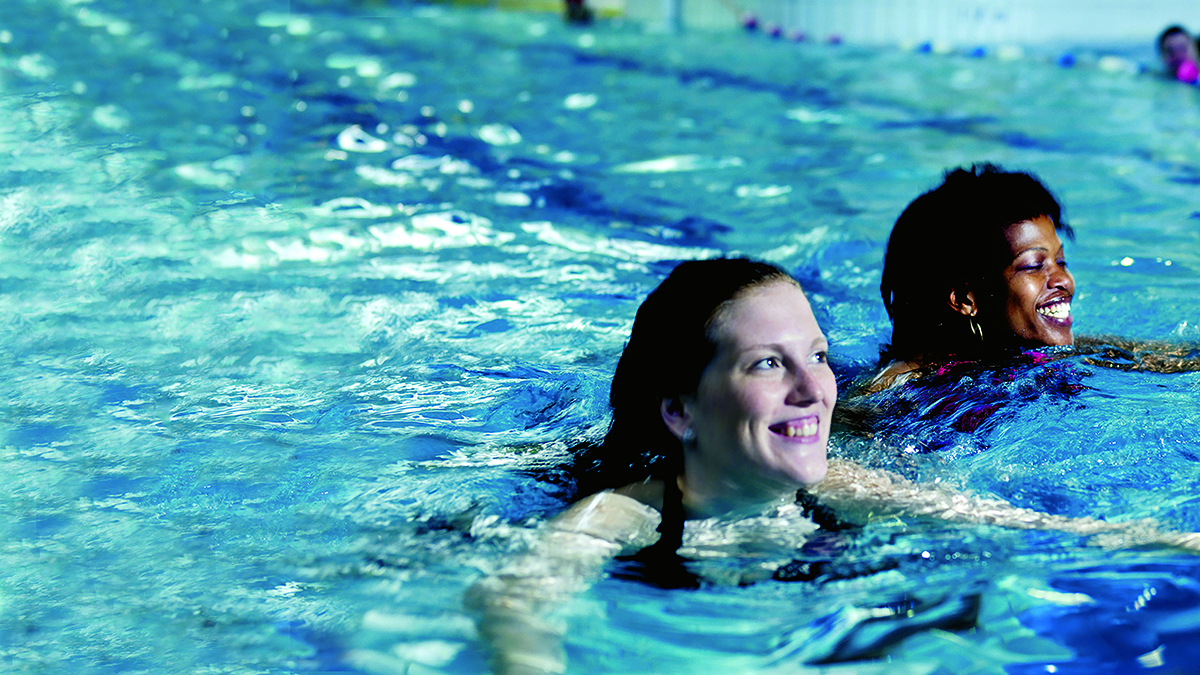
How swimming can help your Mind
18 May 2018As Mental Health Awareness Week, which runs until 20 May, focuses on stress, Hayley Jarvis, community programmes manager for mental health charity Mind, explains how swimming can benefit mental wellbeing.
“We all know that taking part in physical activity like swimming is good for our bodies. But our physical health and mental health are actually really closely linked and being physically active can also be very beneficial for our mental health too.
“When you swim, or do any kind of exercise, you release ‘feel good’ hormones called endorphins which help reduce negative feelings and improve your mood. Exercise also reduces levels of cortisol, the ‘stress hormone’, which has been linked to a range of mental health problems, including depression and anxiety.
“Some people find that exercise helps to break up racing thoughts. As the body tires so does the mind, leaving you calmer and better able to think clearly. Simply taking time out to exercise can also give people the space to think things over and help clear the mind.
Reduce risk of depression
“If you’re more active, there’s good evidence to suggest that at most ages, for both men and women, there’s a trend towards lower rates of depression. In fact, one study has found that by increasing your activity levels from doing nothing, to exercising at least three times a week, you can reduce your risk of depression by up to 30 per cent.
“Some of the many reasons that swimming is a more accessible option for boosting your mental health is that it is a low impact and only moderately intense form of physical activity, which put very little stress on your joints. Being in water itself can be therapeutic and the buoyancy of water is also helpful if you have restricted movement or are overweight.
Major new research
- In 2017, Swim England commissioned major new research into the health benefits of swimming. The Health and Wellbeing Benefits of Swimming report is an independent study that fully explores the impact of swimming on physical, mental and social wellbeing. To view the report, click here
- To find out more about how swimming can improve mental health, click here
“We know that women currently exercise less often than men but want to do more physical activity. Our own polling suggests that for women with mental health problems they are often put off exercise because they don’t feel ‘gym body-ready’ and are embarrassed about their body shape or size. Opportunities such as women-only sessions can make swimming a more accessible option for many.
“Outdoor exercise, such as swimming at your local lido, can be particularly beneficial and research suggests it can actually be as effective as antidepressants in treating mild to moderate depression. The colours, sounds and smells we find outdoors stimulate our senses in a way that the gym or urban environments don’t and so getting physically active outdoors can be better than inside.
Boost your overall mood
“Going to your local lido or, if you’re more adventurous, trying outdoor swimming, can provide great alternatives to doing laps in an indoor pool. Being surrounded by nature can boost your overall mood and being in regular social contact with other people while doing this can help boost your self-esteem and reduce loneliness.
“Mind’s own Get Set to Go project, which supports people with mental health problems to get involved in physical activities, offers opportunities like swimming in several local areas across the country. We recently received the news that Sport England will be using National Lottery funding to extend Get Set to Go for a further three years and you can find out more about how to get involved at mind.org.uk/sport.
“While swimming brings benefits for mental wellbeing for many people, the most important thing is to find a type of activity you love and can stick at. A swimming group or other team activity might be best for you if you find being sociable gives you a boost, while for others who enjoy time to themselves an activity like running might work better. Don’t feel that you have to stick at something that’s not working for you.
“There are hundreds of activities you can do and you’re much more likely to keep doing it if it’s fun.”
 Swim England
Swim England